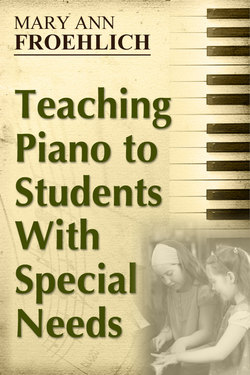Читать книгу Teaching Piano to Students With Special Needs - Mary Ann Froehlich - Страница 7
На сайте Литреса книга снята с продажи.
Concentrated Practice
ОглавлениеDaniel Coyle, in The Talent Code, supports the belief that talent is a myth. Repetition and engaging in deep practice daily are the keys to developing our abilities. Geoff Colvin, in Talent Is Overrated, describes this process as deliberate practice, applicable to musical, artistic, athletic, and business expertise.
Through years of practice, musicians understand that mindless practice, simply going through the motions, does not achieve the same results as concentrated practice, consciously working to correct and improve challenging sections of music. We make the most progress when we isolate the most difficult sections of a piece and focus first on mastering them. I believe that it is almost better for a student not to practice at all than to mindlessly practice, cementing mistakes and bad habits.
We learn through correcting mistakes. Repeated neuron firings grow our myelin. Coyle explains:
Deep practice is a strange concept for two reasons. The first reason is that it cuts against our intuition about talent. Our intuition tells us that practice relates to talent in the same way that a whetstone relates to a knife: it’s vital but useless without a solid blade of so-called natural ability. Deep practice raises an intriguing possibility: that practice might be the way to forge the blade itself.2
Daniel Coyle offers this excellent summation of effective education in The Talent Code3:
1) Circuits are fired and honed.
2) Mistakes are made and corrected.
3) Myelin flourishes.
4) Talent blooms.
As teachers of students with special needs, this is critical information for us to understand: White matter abnormalities, a breakdown in neuron connections, has been found in people with schizophrenia, autism, bipolar disorder, dyslexia, attention deficit disorders, language disorders, dementia, and Alzheimer’s disease. Cross-brain communication is affected. I predict that this realization will impact researching the musical brain in the next decade. If music making is the ideal neural networking experience, which thickens white matter in the brain, grows myelin, and improves connections between brain sites, then music making and learning to play an instrument could play a significant role in helping children who struggle with these disorders, since their brains are yet developing.
In thirty years of experience, I have observed that students with special needs who are passionate about making music and committed to daily concentrated practice will blossom as musicians and pianists. I have observed that often “normal” or even gifted students who are not passionate or committed to daily practice do not make consistent progress. When working with special learners, we must remember that passion and practice are better predictors of musical success than intelligence or natural ability. Because music making is easy for some students does not always translate into working hard to make progress. Sometimes it proves an obstacle. One advantage for special learners is that they have learned how to work hard to overcome their limitations in reaching a goal.
Music therapy and special music education have also been effective in treating patients with dementia and Alzheimer’s disease. While music making can help patients improve and slow the impact of disease, it cannot reorganize the brain as it possibly may in children. Yet adults continue to develop myelin until around age 50. It begins to break down as we age but can be rebuilt with regular practice. Whether we are young or old, music making benefits our brains.
